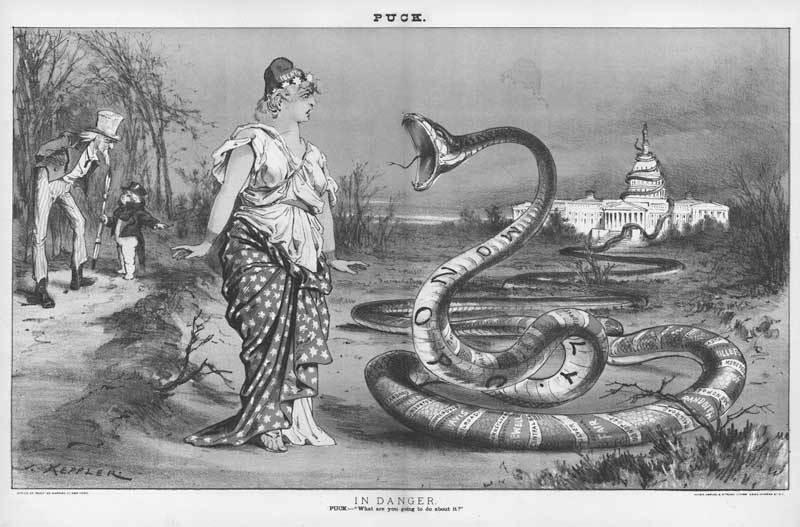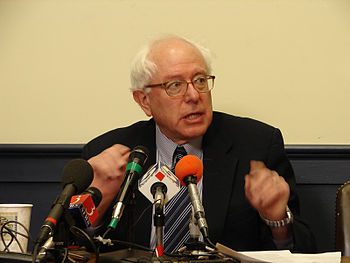For a “progressive” presidential candidate, US Senator Elizabeth Warren (D-MA) is remarkably, well, conservative. Her proposals are neither new nor of the “democratic socialist” variety. In fact, her aim is, as Matthew Yglesias puts it at Vox, “to save capitalism” with stock proposals from the first half of the last century.
Much of her campaign platform co-opts Franklin Delano Roosevelt’s 1930s “New Deal” emphasis on social welfare, job creation, infrastructure, and highly progressive taxation to pay for it all — solutions she considers proven, for problems she considers similar.
Her latest proposal, though, takes an earlier Roosevelt as its model. Like “Trust Buster” Teddy Roosevelt, she wants to use regulation and antitrust enforcement to “break up monopolies and promote competitive markets.” Her initially announced targets for the idea included Facebook, Google, and Amazon. A couple of days later, she added Apple to the list.
Interestingly, in her search for monopolies to slay, she ignores the biggest, most powerful, and most lucrative monopoly in America: The US government.
In 2020, the federal government expects revenues of about $3.4 trillion.
That’s more than 60 times what Facebook brought in last year. 25 times as much as Alphabet’s 2018 revenues (Alphabet is Google’s parent company). More than 14 times Amazon’s total 2018 take. Nearly 13 times Apple’s haul.
And then there’s market share. No one really has to do business with Facebook, Google, Amazon, or Apple. There are numerous alternatives to the offerings of each, and many consumers choose those alternatives.
Uncle Sugar, on the other hand, boasts 100% market share for his offerings. You’re required to be his paying customer whether you like it or not. Many of the alternatives are outright illegal, and among the ones that aren’t, you’re required to pay for them in addition to, not instead of, the federal government’s services.
That’s the very definition of “monopoly.” And it’s the monopoly Elizabeth Warren wants to serve as CEO of.
Is Senator Warren is serious about “breaking up monopolies” and “promoting competitive markets?”
If so, I look forward to her proposal for breaking up the federal government and allowing real alternatives to compete for its market share.
A good start would be 100% federal tax deductibility for the purchase of private sector services that replace the government’s offerings, or a pro rata clawback for binding agreement to not use a particular government service.
Absent such a proposal, seems to me she’s just another greedy monopolist looking to suppress the competition.
Thomas L. Knapp (Twitter: @thomaslknapp) is director and senior news analyst at the William Lloyd Garrison Center for Libertarian Advocacy Journalism (thegarrisoncenter.org). He lives and works in north central Florida.
PUBLICATION/CITATION HISTORY
- “Will Elizabeth Warren Take on the Biggest Monopoly of All?” by Thomas L. Knapp, OpEdNews, 03/13/19
- “Will Elizabeth Warren Take on the Biggest Monopoly of All?” by Thomas L. Knapp, River Cities’ Reader (Iowa), 03/13/19
- “Will Warren take on the biggest monopoly of all?” by Thomas L. Knapp, Hendricks County, Indiana Flyer, 03/14/19
- “Will Elizabeth Warren take on the biggest monopoly of all?” by Thomas L. Knapp, St. George, Utah Daily Spectrum, 03/16/19
- “Will Elizabeth Warren take on the biggest monopoly of all?” by Thomas L. Knapp, Reno, Nevada Gazette Journal, 03/16/19
- “Will Elizabeth Warren take on the biggest monopoly of all?” by Thomas L. Knapp, Fort Collins, Colorado Coloradoan, 03/16/19
- “Will Elizabeth Warren take on the biggest monopoly of all?” by Thomas L. Knapp, Cincinnati, Ohio Enquirer, 03/16/19
- “Will Elizabeth Warren take on the biggest monopoly of all?” by Thomas L. Knapp, USA Today, 03/16/19
- “Will Elizabeth Warren take on the biggest monopoly of all?” by Thomas L. Knapp, Indianapolis, Indiana Star, 03/16/19
- “Will Elizabeth Warren take on the biggest monopoly of all?” by Thomas L. Knapp, Fon du Lac, Wisconsin Reporter, 03/16/19
- “Will Elizabeth Warren take on the biggest monopoly of all?” by Thomas L. Knapp, Milwaukee, Wisconsin Journal Sentinel, 03/16/19
- “Will Elizabeth Warren take on the biggest monopoly of all?” by Thomas L. Knapp, Detroit, Michigan Free Press, 03/16/19
- “Will Elizabeth Warren take on the biggest monopoly of all?” by Thomas L. Knapp, Rochester, New York Democrat & Chronicle, 03/16/19
- “Will Elizabeth Warren take on the biggest monopoly of all?” by Thomas L. Knapp, The Arizona Republic, 03/16/19
- “Will Elizabeth Warren take on the biggest monopoly of all?” by Thomas L. Knapp, El Paso, Texas Times, 03/16/19
- “Will Elizabeth Warren take on the biggest monopoly of all?” by Thomas L. Knapp, Nashville, Tennessee Tennessean, 03/16/19
- “Will Elizabeth Warren take on the biggest monopoly of all?” by Thomas L. Knapp, Claremont, New Hampshire Eagle Times, 03/20/19
- “Warren should take on the biggest monopoly of all,” by Thomas L. Knapp, Greenville, North Carolina Daily Reflector, 03/16/19
- “Will Elizabeth Warren take on the biggest monopoly of all?” by Thomas L. Knapp, Fayette, West Virginia Tribune, 03/28/19
- “Will Elizabeth Warren take on the biggest monopoly of all?” by Thomas L. Knapp, Montgomery, West Virginia Herald, 05/09/19



